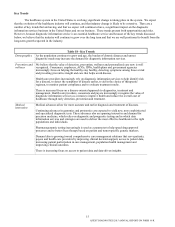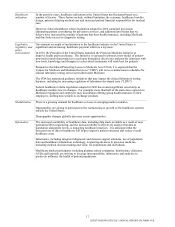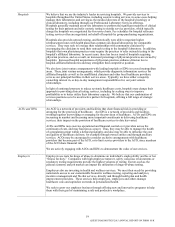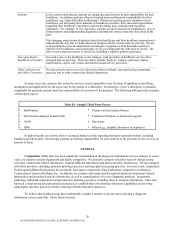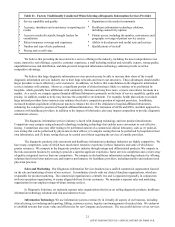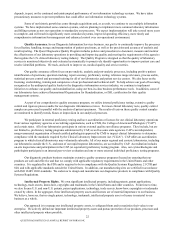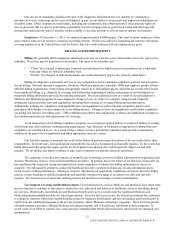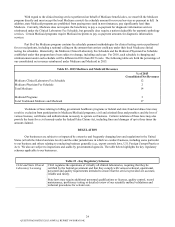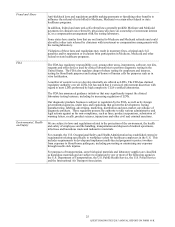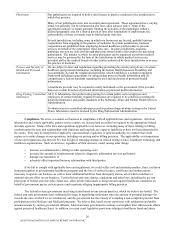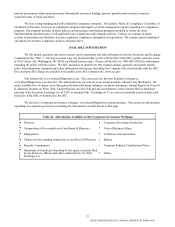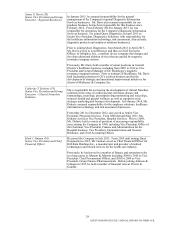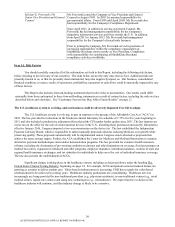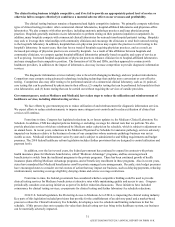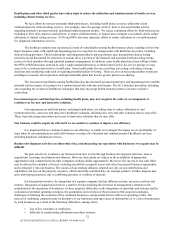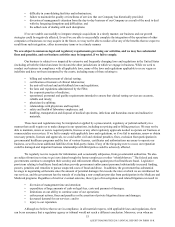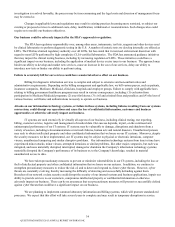Quest Diagnostics 2015 Annual Report Download - page 29
Download and view the complete annual report
Please find page 29 of the 2015 Quest Diagnostics annual report below. You can navigate through the pages in the report by either clicking on the pages listed below, or by using the keyword search tool below to find specific information within the annual report.
25
Fraud and Abuse Anti-kickback laws and regulations prohibit making payments or furnishing other benefits to
influence the referral of tests billed to Medicare, Medicaid or certain other federal or state
healthcare programs.
In addition, federal and state anti-self-referral laws generally prohibit Medicare and Medicaid
payments for clinical tests referred by physicians who have an ownership or investment interest
in, or a compensation arrangement with, the testing laboratory.
Some states have similar laws that are not limited to Medicare and Medicaid referrals and could
also affect other tests referred by clinicians with investment or compensation arrangements with
the testing laboratory.
Violations of these laws and regulations may result in monetary fines, criminal and civil
penalties and/or suspension or exclusion from participation in Medicare, Medicaid and other
federal or state healthcare programs.
FDA The FDA has regulatory responsibility over, among other areas, instruments, software, test kits,
reagents and other devices used by clinical laboratories to perform diagnostic testing in the
United States. The FDA also regulates drugs-of-abuse testing for employers and insurers,
testing for blood bank purposes and testing of donors of human cells for purposes such as in
vitro fertilization.
A number of esoteric tests we develop internally are offered as LDTs. The FDA has claimed
regulatory authority over all LDTs, but has stated that it exercised enforcement discretion with
regard to most LDTs performed by high complexity CLIA-certified laboratories.
The FDA has announced guidance initiatives that may significantly impact the clinical
laboratory testing business, including by increasing regulation of LDTs.
Our diagnostic products business is subject to regulation by the FDA, as well as by foreign
governmental agencies, under laws and regulations that govern the development, testing,
manufacturing, labeling, advertising, marketing, distribution and post-market surveillance of
diagnostic products. These regulators possess the authority to take various administrative and
legal actions against us for non-compliance, such as fines, product suspensions, submission of
warning letters, recalls, product seizures, injunctions and other civil and criminal sanctions.
Environmental, Health
and Safety We are subject to laws and regulations related to the protection of the environment, the health
and safety of employees and the handling, transportation and disposal of medical specimens,
infectious and hazardous waste and radioactive materials.
For example, the U.S. Occupational Safety and Health Administration has established extensive
requirements relating specifically to workplace safety for healthcare employers in the U.S. This
includes requirements to develop and implement multi-faceted programs to protect workers
from exposure to blood-borne pathogens, including preventing or minimizing any exposure
through needle stick injuries.
For purposes of transportation, some biological materials and laboratory supplies are classified
as hazardous materials and are subject to regulation by one or more of the following agencies:
the U.S. Department of Transportation, the U.S. Public Health Service, the U.S. Postal Service
and the International Air Transport Association.
QUEST DIAGNOSTICS 2015 ANNUAL REPORT ON FORM 10-K


